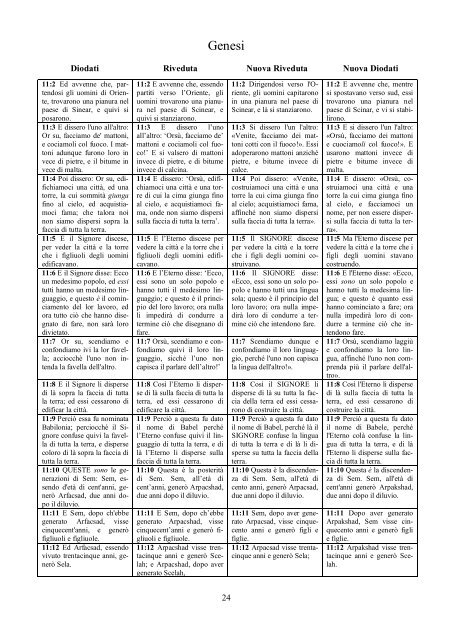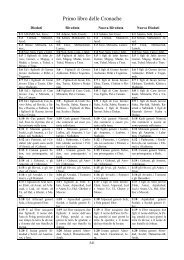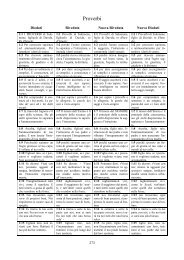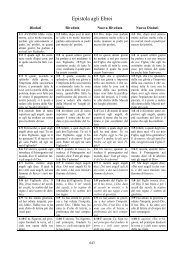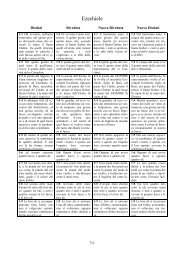Genesi - Chiesa Cristiana Evangelica di Misilmeri
Genesi - Chiesa Cristiana Evangelica di Misilmeri
Genesi - Chiesa Cristiana Evangelica di Misilmeri
You also want an ePaper? Increase the reach of your titles
YUMPU automatically turns print PDFs into web optimized ePapers that Google loves.
<strong>Genesi</strong><br />
Diodati Riveduta Nuova Riveduta Nuova Diodati<br />
11:2 Ed avvenne che, partendosi<br />
gli uomini <strong>di</strong> Oriente,<br />
trovarono una pianura nel<br />
paese <strong>di</strong> Sinear, e quivi si<br />
posarono.<br />
11:3 E <strong>di</strong>ssero l'uno all'altro:<br />
Or su, facciamo de' mattoni,<br />
e cociamoli col fuoco. I mattoni<br />
adunque furono loro in<br />
vece <strong>di</strong> pietre, e il bitume in<br />
vece <strong>di</strong> malta.<br />
11:4 Poi <strong>di</strong>ssero: Or su, e<strong>di</strong>fichiamoci<br />
una città, ed una<br />
torre, la cui sommità giunga<br />
fino al cielo, ed acquistiamoci<br />
fama; che talora noi<br />
non siamo <strong>di</strong>spersi sopra la<br />
faccia <strong>di</strong> tutta la terra.<br />
11:5 E il Signore <strong>di</strong>scese,<br />
per veder la città e la torre<br />
che i figliuoli degli uomini<br />
e<strong>di</strong>ficavano.<br />
11:6 E il Signore <strong>di</strong>sse: Ecco<br />
un medesimo popolo, ed essi<br />
tutti hanno un medesimo linguaggio,<br />
e questo è il cominciamento<br />
del lor lavoro, ed<br />
ora tutto ciò che hanno <strong>di</strong>segnato<br />
<strong>di</strong> fare, non sarà loro<br />
<strong>di</strong>vietato.<br />
11:7 Or su, scen<strong>di</strong>amo e<br />
confon<strong>di</strong>amo ivi la lor favella;<br />
acciocchè l'uno non intenda<br />
la favella dell'altro.<br />
11:8 E il Signore li <strong>di</strong>sperse<br />
<strong>di</strong> là sopra la faccia <strong>di</strong> tutta<br />
la terra; ed essi cessarono <strong>di</strong><br />
e<strong>di</strong>ficar la città.<br />
11:9 Perciò essa fu nominata<br />
Babilonia; perciocchè il Signore<br />
confuse quivi la favella<br />
<strong>di</strong> tutta la terra, e <strong>di</strong>sperse<br />
coloro <strong>di</strong> là sopra la faccia <strong>di</strong><br />
tutta la terra.<br />
11:10 QUESTE sono le generazioni<br />
<strong>di</strong> Sem: Sem, essendo<br />
d'età <strong>di</strong> cent'anni, generò<br />
Arfacsad, due anni do-<br />
po il <strong>di</strong>luvio.<br />
11:11 E Sem, dopo ch'ebbe<br />
generato Arfacsad, visse<br />
cinquecent'anni, e generò<br />
figliuoli e figliuole.<br />
11:12 Ed Arfacsad, essendo<br />
vivuto trentacinque anni, generò<br />
Sela.<br />
11:2 E avvenne che, essendo<br />
partiti verso l’Oriente, gli<br />
uomini trovarono una pianura<br />
nel paese <strong>di</strong> Scinear, e<br />
quivi si stanziarono.<br />
11:3 E <strong>di</strong>ssero l’uno<br />
all’altro: ‘Orsù, facciamo de’<br />
mattoni e cociamoli col fuoco!’<br />
E si valsero <strong>di</strong> mattoni<br />
invece <strong>di</strong> pietre, e <strong>di</strong> bitume<br />
invece <strong>di</strong> calcina.<br />
11:4 E <strong>di</strong>ssero: ‘Orsù, e<strong>di</strong>fichiamoci<br />
una città e una torre<br />
<strong>di</strong> cui la cima giunga fino<br />
al cielo, e acquistiamoci fama,<br />
onde non siamo <strong>di</strong>spersi<br />
sulla faccia <strong>di</strong> tutta la terra’.<br />
11:5 E l’Eterno <strong>di</strong>scese per<br />
vedere la città e la torre che i<br />
figliuoli degli uomini e<strong>di</strong>fi-<br />
cavano.<br />
11:6 E l’Eterno <strong>di</strong>sse: ‘Ecco,<br />
essi sono un solo popolo e<br />
hanno tutti il medesimo linguaggio;<br />
e questo è il principio<br />
del loro lavoro; ora nulla<br />
li impe<strong>di</strong>rà <strong>di</strong> condurre a<br />
termine ciò che <strong>di</strong>segnano <strong>di</strong><br />
fare.<br />
11:7 Orsù, scen<strong>di</strong>amo e confon<strong>di</strong>amo<br />
quivi il loro linguaggio,<br />
sicché l’uno non<br />
capisca il parlare dell’altro!’<br />
11:8 Così l’Eterno li <strong>di</strong>sperse<br />
<strong>di</strong> là sulla faccia <strong>di</strong> tutta la<br />
terra, ed essi cessarono <strong>di</strong><br />
e<strong>di</strong>ficare la città.<br />
11:9 Perciò a questa fu dato<br />
il nome <strong>di</strong> Babel perché<br />
l’Eterno confuse quivi il linguaggio<br />
<strong>di</strong> tutta la terra, e <strong>di</strong><br />
là l’Eterno li <strong>di</strong>sperse sulla<br />
faccia <strong>di</strong> tutta la terra.<br />
11:10 Questa è la posterità<br />
<strong>di</strong> Sem. Sem, all’età <strong>di</strong><br />
cent’anni, generò Arpacshad,<br />
due anni dopo il <strong>di</strong>luvio.<br />
11:11 E Sem, dopo ch’ebbe<br />
generato Arpacshad, visse<br />
cinquecent’anni e generò fi-<br />
gliuoli e figliuole.<br />
11:12 Arpacshad visse trentacinque<br />
anni e generò Scelah;<br />
e Arpacshad, dopo aver<br />
generato Scelah,<br />
24<br />
11:2 Dirigendosi verso l'Oriente,<br />
gli uomini capitarono<br />
in una pianura nel paese <strong>di</strong><br />
Scinear, e là si stanziarono.<br />
11:3 Si <strong>di</strong>ssero l'un l'altro:<br />
«Venite, facciamo dei mattoni<br />
cotti con il fuoco!». Essi<br />
adoperarono mattoni anziché<br />
pietre, e bitume invece <strong>di</strong><br />
calce.<br />
11:4 Poi <strong>di</strong>ssero: «Venite,<br />
costruiamoci una città e una<br />
torre la cui cima giunga fino<br />
al cielo; acquistiamoci fama,<br />
affinché non siamo <strong>di</strong>spersi<br />
sulla faccia <strong>di</strong> tutta la terra».<br />
11:5 Il SIGNORE <strong>di</strong>scese<br />
per vedere la città e la torre<br />
che i figli degli uomini co-<br />
struivano.<br />
11:6 Il SIGNORE <strong>di</strong>sse:<br />
«Ecco, essi sono un solo popolo<br />
e hanno tutti una lingua<br />
sola; questo è il principio del<br />
loro lavoro; ora nulla impe<strong>di</strong>rà<br />
loro <strong>di</strong> condurre a termine<br />
ciò che intendono fare.<br />
11:7 Scen<strong>di</strong>amo dunque e<br />
confon<strong>di</strong>amo il loro linguaggio,<br />
perché l'uno non capisca<br />
la lingua dell'altro!».<br />
11:8 Così il SIGNORE li<br />
<strong>di</strong>sperse <strong>di</strong> là su tutta la faccia<br />
della terra ed essi cessa-<br />
rono <strong>di</strong> costruire la città.<br />
11:9 Perciò a questa fu dato<br />
il nome <strong>di</strong> Babel, perché là il<br />
SIGNORE confuse la lingua<br />
<strong>di</strong> tutta la terra e <strong>di</strong> là li <strong>di</strong>sperse<br />
su tutta la faccia della<br />
terra.<br />
11:10 Questa è la <strong>di</strong>scendenza<br />
<strong>di</strong> Sem. Sem, all'età <strong>di</strong><br />
cento anni, generò Arpacsad,<br />
due anni dopo il <strong>di</strong>luvio.<br />
11:11 Sem, dopo aver generato<br />
Arpacsad, visse cinquecento<br />
anni e generò figli e<br />
figlie.<br />
11:12 Arpacsad visse trentacinque<br />
anni e generò Sela;<br />
11:2 E avvenne che, mentre<br />
si spostavano verso sud, essi<br />
trovarono una pianura nel<br />
paese <strong>di</strong> Scinar, e vi si stabi-<br />
lirono.<br />
11:3 E si <strong>di</strong>ssero l'un l'altro:<br />
«Orsù, facciamo dei mattoni<br />
e cuociamoli col fuoco!». E<br />
usarono mattoni invece <strong>di</strong><br />
pietre e bitume invece <strong>di</strong><br />
malta.<br />
11:4 E <strong>di</strong>ssero: «Orsù, costruiamoci<br />
una città e una<br />
torre la cui cima giunga fino<br />
al cielo, e facciamoci un<br />
nome, per non essere <strong>di</strong>spersi<br />
sulla faccia <strong>di</strong> tutta la ter-<br />
ra».<br />
11:5 Ma l'Eterno <strong>di</strong>scese per<br />
vedere la città e la torre che i<br />
figli degli uomini stavano<br />
costruendo.<br />
11:6 E l'Eterno <strong>di</strong>sse: «Ecco,<br />
essi sono un solo popolo e<br />
hanno tutti la medesima lingua;<br />
e questo è quanto essi<br />
hanno cominciato a fare; ora<br />
nulla impe<strong>di</strong>rà loro <strong>di</strong> condurre<br />
a termine ciò che in-<br />
tendono fare.<br />
11:7 Orsù, scen<strong>di</strong>amo laggiù<br />
e confon<strong>di</strong>amo la loro lingua,<br />
affinché l'uno non comprenda<br />
più il parlare dell'al-<br />
tro».<br />
11:8 Così l'Eterno li <strong>di</strong>sperse<br />
<strong>di</strong> là sulla faccia <strong>di</strong> tutta la<br />
terra, ed essi cessarono <strong>di</strong><br />
costruire la città.<br />
11:9 Perciò a questa fu dato<br />
il nome <strong>di</strong> Babele, perché<br />
l'Eterno colà confuse la lingua<br />
<strong>di</strong> tutta la terra, e <strong>di</strong> là<br />
l'Eterno li <strong>di</strong>sperse sulla fac-<br />
cia <strong>di</strong> tutta la terra.<br />
11:10 Questa è la <strong>di</strong>scendenza<br />
<strong>di</strong> Sem. Sem, all'età <strong>di</strong><br />
cent'anni generò Arpakshad,<br />
due anni dopo il <strong>di</strong>luvio.<br />
11:11 Dopo aver generato<br />
Arpakshad, Sem visse cinquecento<br />
anni e generò figli<br />
e figlie.<br />
11:12 Arpakshad visse trentacinque<br />
anni e generò Scelah.


